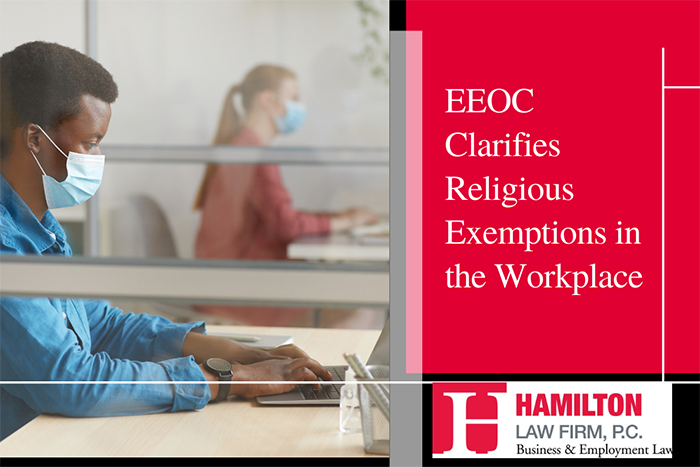On October 25, 2021, the EEOC provided much-needed guidance to both employees and employers on religious exemptions to COVID-19 workplace vaccination mandates. As companies begin returning to the office, many employers are requiring their employees to provide proof of vaccination or claim an exemption from the workplace mandate.
What Does Employment Law Say About These Requirements?
Drawing from the language of Title VII of the Civil Rights Act, the EEOC explained that Title VII protects an employee against discrimination arising from the employee’s ‘sincerely held religious belief, practices, and observances.’
This employment protection, like protections contained in the ADA for disability accommodations, has an “undue hardship” clause, which permits employers to refuse an accommodation for religious exemption when it demonstrates undue hardship in the workplace.
The EEOC guides that after the employee raises the need for the religious exemption, the employer must consider the accommodation requested and engage in an interactive discussion to understand the basis of the exemption. However, the EEOC is clear that the employer is not required to “protect social, political, or economic views, or personal preferences of employees who seek exceptions to the COVID-19 vaccine requirement.”
Advice for Employers
Once you have implemented your workplace vaccine policy, if an employee asserts a religious exemption, you should invite discussion, similar to how you might treat medical exemptions. Tread lightly and focus your inquiry on understanding the ‘sincerely held belief’ and whether you are able to make the accommodation (i.e., accept that the employee will not be vaccinated and how that might create ‘undue hardship’ in your workplace).
Advice for Employees
Be prepared to explain the nature of your religious exemption, not just assert it. To create the presumption of a sincerely held belief, your refusal to accept the COVID-19 vaccination will likely be more widely accepted if it’s based on a history of rejecting vaccines.
You don’t need to use any magic words—religious accommodation, Title VII or the Law Against Discrimination, employment law, etc.—but you do need to explain the basis for the conflict between your sincerely held religious belief and the employer’s COVID-19 vaccination requirement. You may need to also explain any preference for one brand of vaccine or scientific formulation of a vaccine over another.
The Bottom Line
As workplace vaccination mandates roll out, employers must be clear about the mandate’s requirements and who employees should contact to assert an exemption. Once the exemption is asserted, the employer should engage in an interactive discussion.
If you are an employer struggling to interpret religious exemptions to the vaccine mandate and your rights according to employment law, or if you’re an employee claiming an exemption, you’ll benefit from seeking the experienced counsel of an employment lawyer in New Jersey.
Reach out to Hamilton Law Firm to schedule a consultation.


